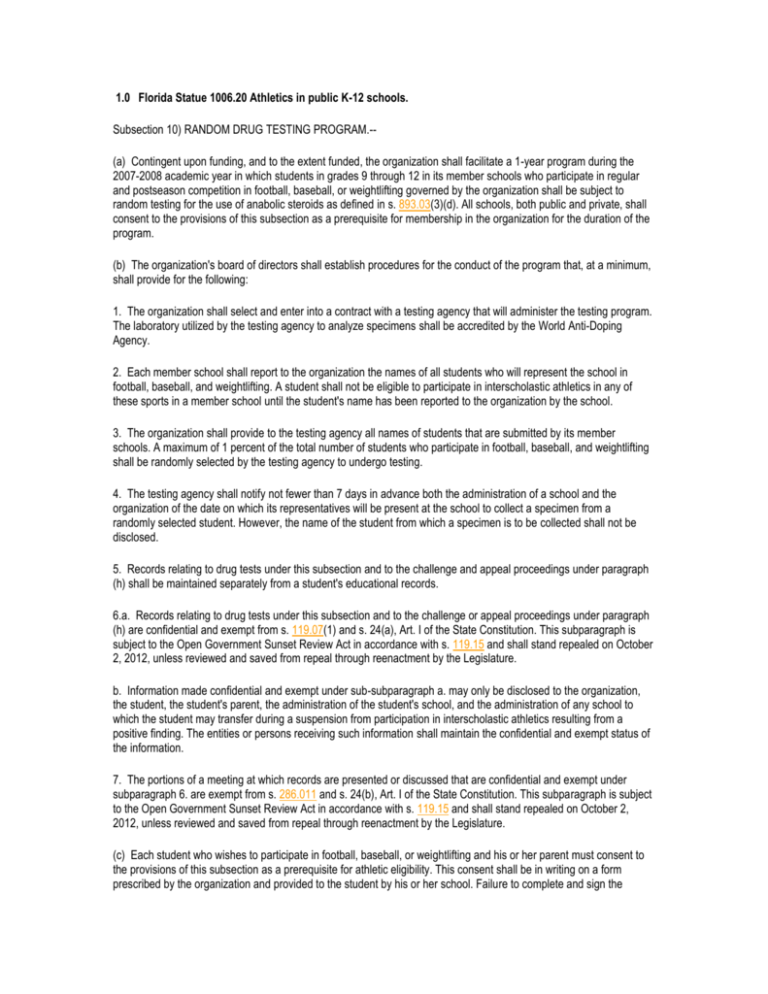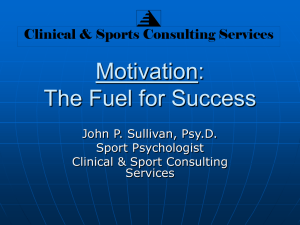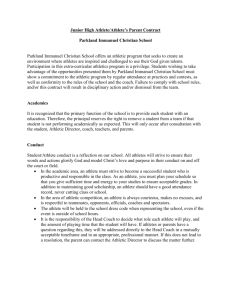Drug Free Sport - Florida High School Athletic Association
advertisement

1.0 Florida Statue 1006.20 Athletics in public K-12 schools. Subsection 10) RANDOM DRUG TESTING PROGRAM.-(a) Contingent upon funding, and to the extent funded, the organization shall facilitate a 1-year program during the 2007-2008 academic year in which students in grades 9 through 12 in its member schools who participate in regular and postseason competition in football, baseball, or weightlifting governed by the organization shall be subject to random testing for the use of anabolic steroids as defined in s. 893.03(3)(d). All schools, both public and private, shall consent to the provisions of this subsection as a prerequisite for membership in the organization for the duration of the program. (b) The organization's board of directors shall establish procedures for the conduct of the program that, at a minimum, shall provide for the following: 1. The organization shall select and enter into a contract with a testing agency that will administer the testing program. The laboratory utilized by the testing agency to analyze specimens shall be accredited by the World Anti-Doping Agency. 2. Each member school shall report to the organization the names of all students who will represent the school in football, baseball, and weightlifting. A student shall not be eligible to participate in interscholastic athletics in any of these sports in a member school until the student's name has been reported to the organization by the school. 3. The organization shall provide to the testing agency all names of students that are submitted by its member schools. A maximum of 1 percent of the total number of students who participate in football, baseball, and weightlifting shall be randomly selected by the testing agency to undergo testing. 4. The testing agency shall notify not fewer than 7 days in advance both the administration of a school and the organization of the date on which its representatives will be present at the school to collect a specimen from a randomly selected student. However, the name of the student from which a specimen is to be collected shall not be disclosed. 5. Records relating to drug tests under this subsection and to the challenge and appeal proceedings under paragraph (h) shall be maintained separately from a student's educational records. 6.a. Records relating to drug tests under this subsection and to the challenge or appeal proceedings under paragraph (h) are confidential and exempt from s. 119.07(1) and s. 24(a), Art. I of the State Constitution. This subparagraph is subject to the Open Government Sunset Review Act in accordance with s. 119.15 and shall stand repealed on October 2, 2012, unless reviewed and saved from repeal through reenactment by the Legislature. b. Information made confidential and exempt under sub-subparagraph a. may only be disclosed to the organization, the student, the student's parent, the administration of the student's school, and the administration of any school to which the student may transfer during a suspension from participation in interscholastic athletics resulting from a positive finding. The entities or persons receiving such information shall maintain the confidential and exempt status of the information. 7. The portions of a meeting at which records are presented or discussed that are confidential and exempt under subparagraph 6. are exempt from s. 286.011 and s. 24(b), Art. I of the State Constitution. This subparagraph is subject to the Open Government Sunset Review Act in accordance with s. 119.15 and shall stand repealed on October 2, 2012, unless reviewed and saved from repeal through reenactment by the Legislature. (c) Each student who wishes to participate in football, baseball, or weightlifting and his or her parent must consent to the provisions of this subsection as a prerequisite for athletic eligibility. This consent shall be in writing on a form prescribed by the organization and provided to the student by his or her school. Failure to complete and sign the consent form shall result in the student's ineligibility to participate in the sport for which the consent form is required. The consent form shall include the following information: 1. A brief description of the drug testing program. 2. The penalties for a positive finding. 3. The procedure for challenging a positive finding. 4. The procedure for appealing a prescribed penalty. (d) A student who is selected for testing and fails to provide a specimen shall be immediately suspended from interscholastic athletic practice and competition until such time as a specimen is provided. (e) If a student tests positive in a test administered under this subsection, the administration of the school the student attends shall immediately: 1. Suspend the student from participation in all interscholastic athletic practice and competition. 2. Notify and schedule a meeting with the student and his or her parent during which the principal or his or her designee shall review with them the positive finding, the procedure for challenging the positive finding, the prescribed penalties, and the procedure for appealing the prescribed penalties. (f) For a positive finding, the student shall be suspended from all interscholastic athletic practice and competition for a period of 90 school days and shall be subject to a mandatory exit test for restoration of eligibility no sooner than the 60th school day of the suspension. If the exit test is negative, the organization shall immediately restore the eligibility of the student. If the exit test is positive, the student shall remain suspended from all interscholastic athletic practice and competition until such time as a subsequent retest of the student results in a negative finding. The student shall be subject to repeated tests for the duration of his or her high school athletic eligibility. (g) In addition to the penalties prescribed in paragraph (f), a student who tests positive in a test administered under this subsection shall attend and complete an appropriate mandatory drug education program conducted by the student's school, the student's school district, or a third-party organization contracted by the school or school district to conduct such an education program. (h) The following due process shall be afforded each student who tests positive in a test administered under this subsection: 1. The member school may challenge a positive finding and must challenge a positive finding at the request of the student. A sample of the original specimen provided by the student and retained by the testing agency shall be analyzed. The member school or the student's parent shall pay the cost of the analysis. If the analysis results in a positive finding, the student shall remain ineligible until the prescribed penalty is fulfilled. If the analysis results in a negative finding, the organization shall immediately restore the eligibility of the student and shall refund to the member school or student's parent the cost of the analysis. The student shall remain suspended from interscholastic athletic practice and competition during the challenge. 2.a. The member school may appeal to the organization's commissioner the period of ineligibility imposed on a student as a result of a positive finding and must appeal at the request of the student. The commissioner may require the student to complete the prescribed penalty, reduce the prescribed penalty by one-half, or provide complete relief from the prescribed penalty. Regardless of the decision of the commissioner, the student shall remain ineligible until the student tests negative on an exit drug test and the student's eligibility is restored by the organization. b. Should the member school or student be dissatisfied with the decision of the commissioner, the school may pursue the appeal before the organization's board of directors and must do so at the request of the student. The board of directors may require the student to complete the prescribed penalty, reduce the prescribed penalty by one-half, or provide complete relief from the prescribed penalty. Regardless of the decision of the board of directors, the student shall remain ineligible until the student tests negative on an exit drug test and the student's eligibility is restored by the organization. The decision of the board of directors on each appeal shall be final. c. Technical experts may serve as consultants to both the organization's commissioner and its board of directors in connection with such appeals. (i) The result of a drug test under this subsection shall not be admissible as evidence in a criminal prosecution. (j) No later than October 1, 2008, the organization shall submit to the President of the Senate and the Speaker of the House of Representatives a report on the results of the program. The report shall include statistics on the number of students tested; the number of violations; the number of challenges and their results; the number of appeals and their dispositions; and the costs incurred by the organization in the administration of the program, including attorney's fees and other expenses of litigation. (k) The organization, members of its board of directors, and its employees and member schools and their employees are exempt from civil liability arising from any act or omission in connection with the program conducted under this subsection. The Department of Legal Affairs shall defend the organization, members of its board of directors, and its employees and member schools and their employees in any action against such parties arising from any such act or omission. In providing such defense, the Department of Legal Affairs may employ or utilize the legal services of outside counsel. (l) The program shall be conducted to the extent funded by the Legislature. In order to conduct the program within appropriated funds, the organization is authorized to implement the program in only one or two of the named sports. All expenses of the program shall be paid with funds appropriated by the Legislature. Such expenses shall include, but not be limited to, all fees and expenses charged by the testing agency for administrative services, specimen collection services, and specimen analysis; all administrative expenses incurred by the organization in the facilitation of the program; and all attorney's fees and other expenses of litigation resulting from legal challenges related to the program. (m) This subsection shall stand repealed on October 2, 2008, unless reviewed and saved from repeal through reenactment by the Legislature. 2.0 Important Dates August 20, 2007 School Consent Forms due to the FHSAA August 22, 2007 Football Rosters due to the FHSAA November 28, 2007 Girls Weightlifting Rosters due to the FHSAA January 30, 2008 Softball Rosters due to the FHSAA February 6, 2008 Baseball Rosters due to the FHSAA February 20, 2008 Boys Weightlifting due to the FHSAA 3.0 Drug Free Sport The National Center for Drug Free Sport® was founded in 1999 by Frank Uryasz, who was previously director of sports sciences for the National Collegiate Athletic Association (NCAA). Our executive staff has more than 50 years of cumulative, professional experience. Drug Free Sport™ was created because there was no national entity that focused on the specific needs of sports organizations. Many organizations tried to do their own drug testing, using inappropriate workplace drug-testing models. Sports organizations needed specific, student-athlete targeted testing, as well as independent program management. Drug Free Sport has developed a number of programs to help institutions evaluate and create effective policies. Our Speakers Bureau provides athletics directors and athletic trainers with a valuable resource to help ensure athlete safety and fair game. Drug Free Sport’s experts have established a group of powerful and effective services to help athletic organizations create a drug free environment. Using Drug Free Sport lends credibility to a drug program. Having a professional outside expert help manage and administer the program not only saves time, it lends authority and impartiality to the program. As experts, Drug Free Sport can initiate a program rapidly, implement it swiftly and produce fast, accurate results. Drug Free Sports’ programs are comprehensive, customized and cost effective. We save our clients money, as well as costly mistakes, embarrassment, lost player time and unfortunate media attention. 4. 0 Supplements and Steroids 4.1 FHSAA Statement on Supplements The Florida High School Athletics Association (FHSAA) affirms the position of the National Federation of State High School Associations that all high school student-athletes and their parents/guardians should consult with their physicians before taking any dietary-supplement product. In addition, school personnel, including coaches, should not dispense any drug, medication or supplement except with extreme caution and in accordance with state regulations and school district policy. School district policies should be developed in consultation with health-care professionals, senior administrative staff of the school district and parents. The U.S. Food and Drug Administration do not strictly regulate the dietary supplement industry. Product manufacturers are allowed to produce and sell dietary supplements even though the safety, purity and efficacy have not been investigated and established. Federal law requires the FDA to prove that a supplement is unsafe before it can be removed from the market. Although federal law prohibits the sale of dietary supplements that contain prohormones, steroid precursors or anabolic steroids themselves, such products continue to be sold over the Internet and through other unreliable sources. There is a chance that a dietary supplement might contain a banned anabolic steroid and there is a chance that the use of supplements might cause a positive drug test. The FHSAA warns student-athletes and their parents/guardians that the use of any dietary supplement is at the student-athlete’s own risk. 4. 2 List of Banned Anabolic Androgenic Steroids The Center for Drug Free Sport has provided the following list of anabolic androgenic steroids that are among those banned as part of the 2007-08 State of Florida/FHSAA Steroid Testing Program: Androstendiol Androstendione Bolandiol Bolasterone Boldenone Boldione Clostebol Dehydrochlormethyltestosterone Dehydroepiandrosterone (DHEA) Desoxymethyltestosterone Dihydrotestosterone Drostanolone Epitestosterone Epitrenbolone Ethylestrenol Fluoxymesterone Formebolone Furazabol Gestrinone Hydroxytestosterone Mestanolone Mesterolone Metenolone Methandienone Methandriol Methasterone Methyldienolone Methyltestosterone Methylnortestosterone Methyltrienolone Methyltestosterone Nandrolone Norandrostenediol Norandrostenedione Norbolethone Norclostebol Norethandrolone Oxabolone Oxandrolone Oxymesterone Oxymetholone Quinbolone Stanozolol Testosterone** Tetrahydrogestrinone (THG) Trenbolone and their metabolites and isomers and other substances with a similar chemical structure. **an adverse analytical fining (positive result) based on any reliable analytical method (e.g., IRMS, GCMS, CIR) which shows that the testosterone is of exogenous origin, or if the ratio of the total concentration of testosterone to that of epitestosterone in the urine is greater than 6:1, unless there is medical evidence that this ratio is due to a physiological or pathological condition. 5.0 Testing Procedures 5.1 Forms 5.1.1 School Consent Form All member schools principals must sign and send to the FHSAA office a consent form agreeing to the provisions of the program as a prerequisite for membership in the FHSAA. 5.1.2 Student- Athlete Consent Form All student-athletes participating in baseball, softball, girls and boys weightlifting, football, and flag football must sign a consent form agreeing to the provisions of the program. These forms will be kept on file at the school. 5.1.3 Rosters All member schools must submit a roster for each sport before the season begins. The rosters will be submitted electronically to testingrosters@fhsaa.org. 5.2 Selection Prior to testing Drug Free Sport will randomly select the schools as well as the athletes to be tested. After the school is selected, Drug Free Sport will notify the school and the FHSAA no fewer than seven days in advance of when their representatives will be on campus. (Testing will take place during the school day) If a school is selected they will be required to submit an accurate and complete roster to the FHSAA for Drug Free Sport. All students in grades 9-12 that participate in practice and/or competitions during the regular season should be included on the roster. The required roster must be submitted by 5pm Eastern Standard Time on the third day after being notified. If a student quits the team after the roster is submitted, the school should resubmit the new roster as soon as possible. No student should quit to avoid the test. Once a student quits, in order to be allowed back on the team they must submit a specimen at the expense of the school or parent in order to become eligible. When a school is notified by Drug Free sport that they have been selected for steroid testing they should inform Drug Free sport of any event that may affect the attendance of multiple student-athletes such as standardize testing or field trips. The school should also notify home school students and dual enrollment students if they have been selected. Drug Free sport will wait for those students to arrive. The selected school must provide the following: o A private room for testing. o o A site coordinator that will assist in getting the students to the testing room, verify student’s identity, and help maintain proper conduct by the students being tested, if needed. They must have the consent forms for each student being tested. The site coordinator will not collect any specimen. Any school found not in compliance with the FHSAA policy regarding steroid testing will be subject to penalties under Policy 44 of the FHSAA Handbook. 5.3 Testing Day When the certified collector arrives on campus, he/she will have a list of students that have been selected for testing. The Drug Free Sport Representative will then ask for the school’s site coordinator. The student-athlete(s) will be called to the office, directed to a private room and provide a specimen. A parent is allowed to be present during the test, but the collectors will not stop or delay testing waiting for a parent to arrive. If a student-athlete is absent on the day of testing, for any reason; including an excused absence, the student will immediately be declared ineligible until he/she submits a specimen. It will be the responsibility of the school or the parent to pay the cost of the make-up test. A test administered by any entity other than Drug Free Sport will not be accepted. However, the school is permitted to call any student who is not in attendance and notify them that they were selected for testing. The FHSAA Executive Director has the authority to review each ineligibility case due to absence on a case by case basis. 5. 4 Drug Free Sport Collection Protocol 1. Only those persons authorized by the collection crew chief or client representative/site coordinator will be allowed in the collection station. 2. Upon entering the collection station, the athlete will provide photo identification and/or a client representative/site coordinator will identify the athlete and the athlete will officially be signed into the collection station. 3. The crew chief and/or client representative may release a sick or injured athlete from the collection station or may release an athlete to return to competition or meet academic obligations only after appropriate arrangements for having the athlete tested have been made and documented. 4. The athlete will select a sealed collection beaker from a supply of such and will record his/her initials on the collection beaker’s lid or attach a unique bar code label to the beaker. 5. Athletes may not carry any item other than his/her beaker into the restroom when providing a specimen. The athlete must remove all outer clothing (e.g., jackets, sweaters). Any problem or concern should be brought to the attention of the collection crew chief or client representative for documentation. Athletes must rinse (water only, no soap) and dry hands prior to urination. 6. A collector, serving as a monitor to assure the integrity of the specimen until the designated volume of urine has been collected, will stay with the athlete in the room. The monitor must secure the room being used for the monitored collection so that no one except the athlete and the monitor can enter it until after the collection has been completed. Dying agents will be added to toilet bowls to prevent sample substitution and any unsupervised access to water will be eliminated during the collection process. 7. Monitors must be members of the official drug-testing crew and of the same gender as the athlete providing the sample. The procedure requires the athlete to empty contents of all pockets and place in container to be left in a location where the athlete and the monitor can observe. The monitor must request the athlete raise his/her shirt high enough to observe the midsection area completely ruling out any attempt to manipulate or substitute a sample. 8. The monitor will instruct the athlete to rinse and dry hands (no soap). 9. The monitor will allow the athlete to enter the stall and close the door for privacy during the voiding process. If the monitor hears sounds or makes other observations indicating an attempt to tamper with a specimen, there must be an additional collection. 10. Once a specimen is provided (approximately 90 mL), the athlete is responsible for keeping the collection beaker closed and controlled. The monitor will escort the athlete to the collection processing area. 11. Fluids and food given to athletes who have difficulty voiding must be from sealed containers (approved by the collector) that are opened and consumed in the station. These items must be free of any banned substances. 12. If the specimen is incomplete, the athlete must remain in the collection station until the sample is completed. An initial temperature reading from the beaker will be recorded. During this period, the athlete is responsible for keeping the collection beaker closed and controlled. 13. If the specimen is incomplete, the specimen will remain in the collection beaker and sealed in a specimen bag. The specimen will remain in the possession of the student-athlete through-out the collection process. 14. Once the student-athlete wishes to provide another specimen, the athlete will begin the collection procedure again. Repeat steps 4-9. 15. The collection processor will pour off a small volume of the specimen into a separate container to perform specimen validity checks. Specific gravity will be measured first, and if in range, the collector will measure the pH of the urine in the presence of the athlete. 16. If the urine has a specific gravity below 1.005 (1.010 if measured with a reagent strip), the specimen will be discarded by the athlete. The athlete must remain in the collection station until another specimen is provided. The athlete will provide another specimen. 17. If the urine has a pH greater than 7.5 or less than 4.5 (with reagent strip), the specimen will be discarded by the athlete. The athlete must remain in the collection station until another specimen is provided. The athlete will provide another specimen. 18. If the urine has a specific gravity above 1.005 (1.010 if measured with a reagent strip) and the urine has a pH between 4.5 and 7.5 inclusive, the specimen will be processed and sent to the laboratory. 19. The laboratory will make final determination of specimen adequacy. 20. If the laboratory determines that an athlete’s specimen is inadequate for analysis, at the client’s discretion, another specimen may be collected. 21. If an athlete is suspected of manipulating specimens (e.g., via dilution), the client will have the authority to perform additional tests on the athlete. 22. Once a specimen has been provided that meets the on-site specific gravity and pH parameters, the athlete will select a specimen collection kit and a uniquely numbered Chain of Custody Form (or uniquely numbered set of bar code seals) from a supply of such. 23. A collector will record the specific gravity and pH values. 24. For split sample packaging, the collector will pour a minimum of 60 mL (90 mL maximum) of the specimen into the “A vial” and the remaining amount (approximately 25 mL) into the “B vial” in the presence of the athlete. Samples will be shipped to a WADA accredited laboratory. 25. The collector will place the cap on each vial in the presence of the athlete; the collector will then seal each vial in the required manner under the observation of the athlete and witness (if present). 26. Vials and forms (if any) sent to the laboratory shall not contain the name of the athlete. 27. All sealed specimens will be secured in a shipping case. The collector will prepare the case for forwarding. 28. The athlete, processing collector, monitor and witness (if present) will sign affidavits on the Custody and Control Form (paper or paperless) affirming all procedures were followed as described in the protocol. Any deviation from the procedures must be described and recorded. If deviations are alleged, the athlete will be required to provide another specimen. 29. After the collection has been completed, the specimens will be forwarded to the laboratory and copies of any forms forwarded to the designated persons. 30. 31. The specimens become the property of the client. If the athlete does not comply with the collection process, the collector will notify the client representative/site coordinator and third party administrator responsible for management of the drug-testing program. 6. 0 Results Drug Free Sport will notify FHSAA of its findings within 10-14 business days. The FHSAA will notify the schools immediately of the results. No parent, athletic director, or principal should call Drug Free Sport to get results. The FHSAA will notify the school administrator. 6. 1 Positive Results If a student tests positive the school must immediately suspend the student from participation in ALL interscholastic athletic practice and competition for 90 days. Notify and schedule a meeting with the student and his/her parent. o In the meeting with the parent(s), the principal or designee shall review the positive finding, the appeals process, and the penalties. For a positive finding, a mandatory exist test no sooner than 60 days is required. If the exist test is negative then eligibility is immediately restored. If the exist test is positive, the student remains ineligible until a negative finding. Once a student tests positive for steroids he/she will no longer be random. FHSAA will pay for the initial exit test; the parent(s) must pay for any test after. The student-athlete must attend and complete a drug education program conducted by the school, the school district or a third party organization contracted by the school or school district. The results shall be kept in a separate location than all other school files. The results shall not be published in the student’s permanent record. 7.0 Appeals Process A school may challenge a positive finding and must challenge the finding at the request of the studentathlete. The challenge must be filled with the FHSAA office. The original sample of the student’s specimen obtained by Drug Free Sport will be analyzed, at the expense of the school. o If the analysis results in a second positive finding, the student athlete will remain suspended. o If the analysis results in a negative finding, the FHSAA will reinstate the student-athlete and refund the cost of the analysis. o The student-athlete will remain suspended during the challenge. A school may appeal a suspension and must appeal the suspension at the request of the student-athlete. The appeal must be made to the Commissioner, who may uphold the full suspension, reduce the suspension by half, or reinstate the student-athlete. The school and/or student-athlete may appeal an unfavorable decision by the Commissioner to the Board of Directors, which, likewise may uphold the full suspension, reduce the suspension by half, or reinstate the student-athlete. The student-athlete, however, will remain suspended until he/she tests negative on an exist test regardless of the decision of the Commissioner of the Board of Directors. 8.0 Report Outcomes No later than October 1, 2008, the organization shall submit to the President of the Senate and the Speaker of the House of Representatives a report on the results of the program. The report shall include statistics on the number of students tested; the number of violations; the number of challenges and their results; the number of appeals and their dispositions; and the costs occurred by the organization in the administration of the program, including the attorney’s fees and the other expenses of litigation. The results will be reported to the Florida Department of Education.






